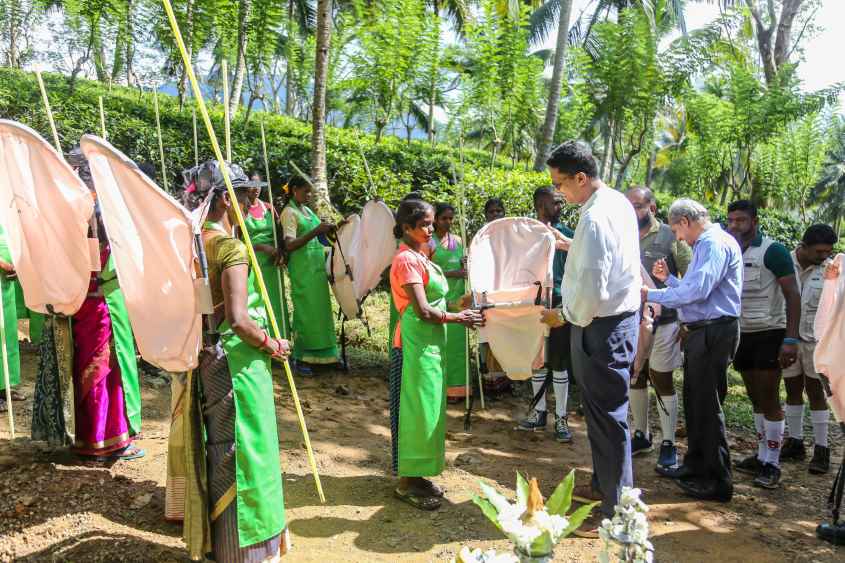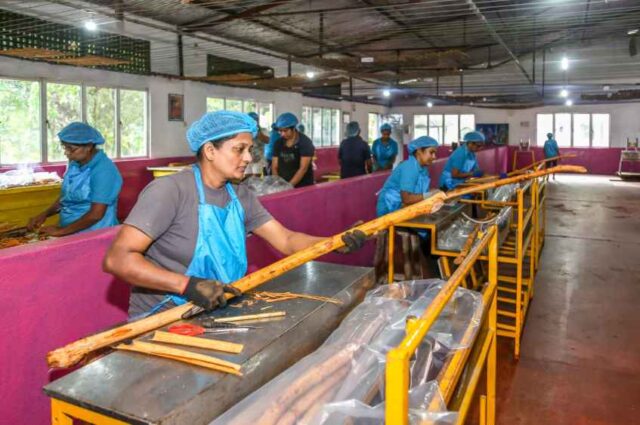
Our latest Regional Plantation Company (RPC) Innovation Update highlights one of Sri Lanka’s trailblazers in sustainable, ethical and community-centric plantation management – Kahawatte Plantations PLC (KWPL) under the MJF Group.
KWPL was established in alignment with the MJF Group’s vision that ‘Business is a Matter of Human Service’, As such their pioneering initiatives not only boost agricultural excellence but also significantly uplift the living standards of their plantation communities and beyond.
KWPL has been at the forefront of a broader movement aimed at fostering innovation and standardizing plantation practices to harmonize economic goals with profound social responsibility. The company has been an advocate for a progressive model that integrates comprehensive welfare programs, environmental stewardship, and community empowerment into its corporate ethos, thus supporting the progressive evolution of Sri Lanka’s plantation industry.
With a history steeped in the rich tradition of Ceylon tea, rubber, cinnamon and an array of diverse crops, KWPL’s journey is marked by its pursuit of excellence in every leaf and life it touches. The company’s strategic approach goes beyond cultivating crops; it cultivates a sustainable future for all its stakeholders. KWPL’s people-centric strategy is a proactive step towards the diverse ways in which an industry leader can contribute to both the sector and the personnel at its frontlines.

KWPL’s estates span12,400 hectares across the Nawalapitiya and Sabaragamuwa plantation districts. Within each, KWPL is engaged in cultivating tea, cinnamon, rubber, and timber. In the last three years, the company has further expanded its portfolio by venturing into coffee, coconut, and pepper cultivation as part of a strategic diversification that will further strengthen the company’s resilience to increasingly volatile global market conditions, and enhance its value addition potential.
From its inception, Kahawatte has been driven by the philosophy of its parent body, propelling it to take the lead in various community welfare programs across the sixteen estates under its care. What distinguishes these initiatives is their profound impact, as the benefits transcend the plantation population, positively influencing neighbouring communities.
Moreover, the company is committed to a significant investment of Rs. 120 million in the fiscal year 2023/2024 towards development initiatives. This substantial investment will encompass the enhancement of 20 Childhood Development Centres (CDCs), restroom facilities, re-roofing projects, and healthcare centres. The primary objective is to ensure the provision of quality care not only for the employees but also for individuals in the surrounding communities.
Empowering Future Generations
In a bid to address malnutrition, KWPL has actively implemented nutritional enhancement programs for children under the age of 5 across 84 Childhood Development Centres (CDCs). Initiated in 2007, these programs provide crucial support to an average of 950 students daily.
Beyond nutritional supplements, children transitioning from the CDCs after completing primary education receive essential items, including school bags and accessories, before enrolling in government schools. Given the high cost of such necessities, this program has furnished nearly 10,000 students from Kahawatte Plantations with brand new school supplies free of charge in order to facilitate their educational journeys.
To address gaps in educational opportunities, Kahawatte has established a scholarship scheme supporting eligible students aiming for Advanced Level and university education. The immediate, measurable benefits are evident, with approximately 300 youths from the Kahawatte estates having benefitted from this scheme. The program has already produced two medical doctors and two lawyers from within Kahawatte’s resident population. Also among the alumni of the scholarship scheme are a sitting judge in a Jaffna Magistrate’s court, five students pursuing medical degrees at Jaffna, Peradeniya, and Rajarata universities, while others have qualified for entry into faculties such as Management Studies, Architecture, Nursing, Sociology, Estate Management, and Valuation.
Healthcare Initiatives and Community Impact
Infrastructure improvement has been another key pillar of Kahawatte’s holistic approach to social development. Projects such as the enhancement of field restrooms, installation of domestic toilets, improved water supply, construction of new worker housing, significant rehabilitation of existing housing, and the establishment of new health centres have been undertaken across the estates of Kahawatte Plantations.
In 2021, responding to an appeal from the Provincial Director of Health, Central Province, Kahawatte collaborated with the Merrill J Fernando Charitable Foundation (MJFCF) to contribute to the establishment of a State-of-the-Art, 8-bed High Dependency Care Unit at the Nawalapitiya District Government Hospital. The decision on the facility’s location was influenced by the presence of seven estates belonging to KWPL in the region. This facility is poised to be a crucial addition to a hospital that caters to approximately 500,000 residents of the district.
Economic Interdependence: Plantations as Catalysts for Local Prosperity
The multifaceted contributions of KWPL extend well beyond cultivation and strengthening the bottom line. Central to their impact is the provision of stable employment for plantation residents and nearby communities, fostering economic resilience in the regions where their estates thrive. This economic symbiosis, however, reaches far beyond direct employment, as it encompasses a diverse array of small and medium entrepreneurs who play pivotal roles in supporting the plantation sector.
This intricate network of services spans a wide spectrum, ranging from traders and ancillary service providers to skilled artisans, basket weavers, and even casual manual labourers. Beyond these, tea small-holders and private growers find themselves direct beneficiaries of the existence of large commercial plantations. Despite residing outside the immediate plantation boundaries, the livelihoods of these individuals are intricately woven into the fabric of the plantation sector, forming a symbiotic relationship that contributes significantly to the economic health of the broader society.



